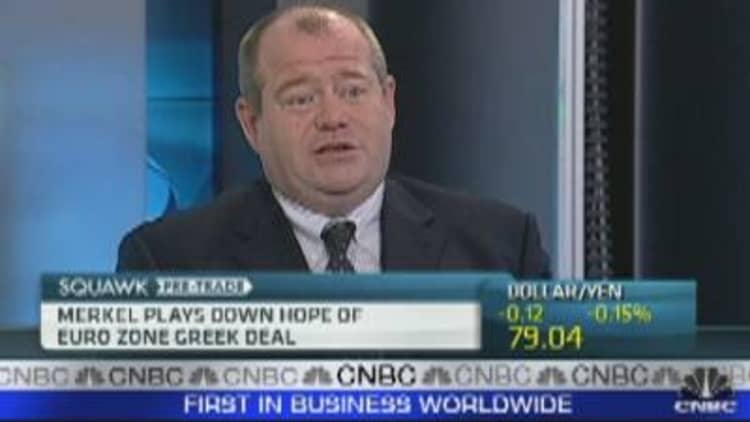Germany, the euro zone's largest economy, should be prepared to take a downgrade to its AAA-rated debt to help save the single currency area, Charles Diebel, head of market strategy at Lloyds, told CNBC Wednesday.
"You have joined this club, and you had to realise there was a liability that went with it," he said. "Germany should really be doing a cost-benefit analysis of what it costs them not to help."
A break-up of the euro zone would be a "cataclysmic scenario" while a downgrade of Germany's AAA-related debt one notch would only mean a 30-50 basis points cut to its credit swaps, according to the Lloyds strategist.
"That's a lot better than your entire banking system getting into trouble from a break- up of the euro," he said. "If you look at where European swaps are trading, that's effectively a proxy for the Bund anyway."

EU leaders will meet Thursday to discuss the Greek debt crisis, with German Chancellor Angela Merkel and French President Nicolas Sarkozy meeting on Wednesday. Merkel has warned that there is "not one spectacular result that will solve all problems".
John M. Hydeskov, chief analyst at Danske Markets, said Nordic banks came particularly strongly out of the recent stress tests as Danske ran a harsher stress test over the Nordic banks which were put through the EBA stress tests.
"Markets have been impatient for quite a long time," Hydeskov told CNBC Wednesday.
Some of the smaller, steadier European economies, such as Holland, Finland and Austria, are worth investing in, according to Diebel. The current Italian and Spanish yields "are not justified by the fundamental factors", Hydeskov said.
"If you look at the private sector wealth in Italy it's pretty impressive," he said. The strength of domestic investment in Italy, where around half of government bonds are held by the domestic market, is viewed by many as strength relative to Greece and other peripheral euro zone economies.
"You can control the domestic market to some extent," Hydeskov added.
He said that domestic Italian investors were unlikely to suddenly switch from bonds, as "now is not the time to switch investment strategy".


